
Lancet Digital Health
Scope & Guideline
Transforming Health Systems with Cutting-Edge Research.
Introduction
Aims and Scopes
- Digital Health Innovations:
The journal covers a wide range of innovations in digital health, including telemedicine, mobile health applications, and wearable technology, focusing on their effectiveness and integration into healthcare systems. - Artificial Intelligence in Healthcare:
A significant focus is on the application of artificial intelligence and machine learning in diagnostics, treatment planning, and patient management, highlighting both the potential benefits and challenges associated with these technologies. - Health Data Utilization:
Research published often explores the use of health data, including electronic health records and big data analytics, to improve healthcare delivery, predictive modeling, and personalized medicine. - Patient-Centered Approaches:
The journal emphasizes the importance of patient engagement and the co-design of digital health interventions, ensuring that innovations are tailored to meet the needs of diverse populations. - Ethics and Regulation in Digital Health:
It critically examines ethical considerations, regulatory frameworks, and the implications of data privacy in the context of digital health technologies.
Trending and Emerging
- Integration of AI in Clinical Settings:
There is a growing body of research focused on the practical integration of AI tools in clinical settings, including decision support systems and diagnostic aids, demonstrating a shift towards real-world applications. - Remote Monitoring and Telehealth:
The emphasis on remote monitoring technologies and telehealth services has surged, particularly in response to the COVID-19 pandemic, highlighting their role in maintaining patient care during crises. - Focus on Health Equity:
An increasing trend towards addressing health disparities and ensuring equitable access to digital health technologies is evident, reflecting a broader societal commitment to inclusivity in health interventions. - Data-Driven Personalized Medicine:
Emerging studies are focusing on personalized medicine approaches driven by data analytics, utilizing machine learning to tailor treatments to individual patient profiles. - Ethics and Governance of AI:
Research exploring the ethical implications and governance of AI in healthcare is on the rise, indicating a growing recognition of the need for responsible AI deployment.
Declining or Waning
- Traditional Clinical Trials:
There has been a noticeable decrease in publications focused on traditional clinical trial methodologies as the journal shifts towards more innovative and technology-driven approaches to health interventions. - General Health Interventions without Digital Integration:
Research that does not incorporate digital tools or technologies into health interventions appears less frequently, indicating a waning interest in non-digital health strategies. - Single-Discipline Studies:
Studies that focus solely on one discipline (e.g., pharmacology or surgery) without integrating digital health perspectives are becoming less common, as interdisciplinary approaches gain traction.
Similar Journals

mHealth
Connecting Technology and Health for Better OutcomesmHealth is a pivotal peer-reviewed journal published by AME PUBLISHING COMPANY, focusing on the evolving field of mobile health technologies and their impact on public health and health informatics. With an E-ISSN of 2306-9740, this journal, based in China, operates under an open access model, ensuring widespread dissemination and accessibility of published research. As of 2023, mHealth is recognized in the Q2 category for both Health Informatics and Public Health, Environmental and Occupational Health, reflecting its significant contribution to vital areas of contemporary health research. The journal's Scopus rankings further enhance its reputation, situating it in the 74th percentile for Public Health and 64th for Health Informatics, making it an essential resource for researchers, professionals, and students eager to explore the intersection of technology and health outcomes. Covering a diverse range of topics from 2019 through 2024, mHealth aims to foster innovation and knowledge exchange among practitioners and scholars alike.

Healthcare Technology Letters
Bridging the gap between technology and health outcomes.Healthcare Technology Letters is a leading open-access journal published by WILEY that has been at the forefront of disseminating cutting-edge research in the field of health informatics and health information management since its inception in 2014. With an E-ISSN of 2053-3713, this esteemed journal is recognized for its commitment to advancing knowledge and practice in healthcare technology, making it a vital resource for researchers, professionals, and students alike. The journal's scope encompasses a wide range of topics, including digital health solutions, data management, and innovative technologies that enhance patient care. It holds a respectable position in the academic community, featuring a Q3 ranking in both health informatics and health information management as of 2023, and consistently contributing to high-impact research evidenced by its Scopus rankings. By providing open access to its content since 2017, Healthcare Technology Letters ensures that valuable insights and breakthroughs can reach a broader audience, furthering the impact of its published work on the global health landscape.
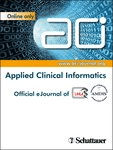
Applied Clinical Informatics
Transforming healthcare through innovative informatics.Applied Clinical Informatics is a leading journal dedicated to the expanding field of health informatics and its applications within clinical settings. Published by GEORG THIEME VERLAG KG in Germany, this journal serves as a pivotal platform for researchers and professionals engaged in the integration of technology and healthcare, aiming to improve patient outcomes through innovative informatics solutions. With a solid Q2 ranking in multiple disciplines including Computer Science Applications, Health Informatics, and Health Information Management, it reflects its prominent position in the academic landscape. The journal provides accessible content while fostering dialogue on key issues and advancements in clinical informatics. Covering a wide array of topics from data management to e-health applications, Applied Clinical Informatics is essential reading for those looking to stay attuned to the latest research and developments from 2009 to 2024, enriching the knowledge base of students, professionals, and researchers worldwide.
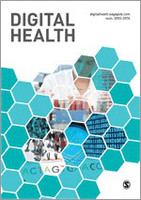
Digital Health
Pioneering the Digital Frontier of Health and Medicine.Digital Health is a pioneering open-access journal published by SAGE Publications Ltd, dedicated to advancing the field of health technology and its intersection with health policy, informatics, and the broader medical landscape. Since its inception in 2015, the journal has rapidly established itself as an essential resource for researchers, professionals, and students, serving as a platform for innovative research that leverages digital tools to improve health outcomes. Currently ranked in the Q2 category across four relevant domains, including Computer Science Applications and Health Informatics, it commands respect within the academic community. With its accessible framework, Digital Health facilitates the dissemination of critical findings and new methodologies that inform policy and practice. The journal’s commitment to open access promotes worldwide access and cooperation, making significant contributions to the evolving landscape of digital health.
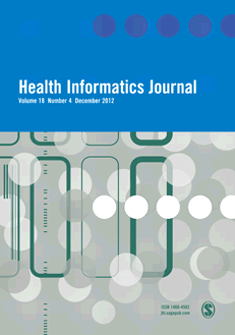
Health Informatics Journal
Unlocking insights at the intersection of health and technology.Health Informatics Journal, published by SAGE Publications Inc., serves as a premier platform for research and discussion in the dynamic field of health informatics since its inception in 1995. With an impressive Q2 ranking in the Health Informatics category and a notable 77th percentile ranking in the Scopus database, this journal provides an essential resource for academics and professionals alike. The journal's transition to Open Access since 2020 has further broadened its reach, ensuring that innovative research is accessible to a global audience. Covering a wide range of topics within health informatics, the journal aims to foster high-quality scholarly communication and facilitate the dissemination of cutting-edge insights that can help advance health care delivery and patient outcomes. With an ongoing commitment to excellence, the Health Informatics Journal is dedicated to enhancing the intersection of technology and healthcare through rigorous research and collaborative exploration.
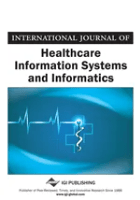
International Journal of Healthcare Information Systems and Informatics
Pioneering solutions for a data-driven healthcare landscape.International Journal of Healthcare Information Systems and Informatics is a prestigious academic journal published by IGI Global, focusing on the vital intersection of healthcare and information technology. With an ISSN of 1555-3396 and E-ISSN of 1555-340X, this journal serves as a pivotal platform for researchers, professionals, and students to explore innovative solutions and advancements in healthcare informatics. As of 2023, it holds a commendable Q3 ranking in categories such as Information Systems and Medicine, highlighting its significant contribution to the academic community. Covering a wide range of topics from healthcare data management to the implementation of information systems in clinical settings, the journal aims to foster critical discussions and disseminate impactful research. With a publication history spanning from 2006 to 2024, it continues to play a crucial role in guiding the future of healthcare information systems. Readers can access this journal through traditional subscription methods, ensuring that leading-edge research reaches those most invested in the evolution of healthcare informatics.

JAMIA Open
Connecting minds, shaping the future of healthcare.JAMIA Open is an open-access journal dedicated to advancing the field of health informatics, published by Oxford University Press. Since its inception in 2018, the journal has provided a platform for novel research, reviews, and case studies that bridge the gap between healthcare and information technology. With an impressive impact factor and a current classification in the Q2 quartile for Health Informatics, JAMIA Open has established itself as a vital resource for researchers and practitioners alike, facilitating the dissemination of innovative findings that contribute to the evolution of healthcare systems. Based in the United States, the journal is committed to providing free and equitable access to high-quality research, thus promoting a collaborative and informed approach to tackling pressing health issues. As it continues to grow and evolve, JAMIA Open remains a cornerstone in the landscape of health informatics, appealing to a diverse audience of researchers, professionals, and students looking to inspire change in their fields.
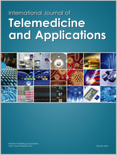
International Journal of Telemedicine and Applications
Bridging gaps in healthcare with state-of-the-art research.International Journal of Telemedicine and Applications is a premier open-access journal published by HINDAWI LTD, focused on the rapidly evolving field of telemedicine and health informatics. With an ISSN of 1687-6415 and E-ISSN of 1687-6423, this journal has been a key resource for researchers, healthcare professionals, and students since its inception in 2007. Based in Egypt, the journal has established a global presence, reflected in its diverse range of articles that cover topics from computer networks to health information management. Its impact is underscored by its impressive rankings in Scopus, including notable positions such as 34th in Health Informatics and 15th in Health Information Management. The journal is classified in Q2 quartiles for four influential categories, showcasing its relevance and contribution to the field. With an ongoing publication timeline from 2008 to 2024, International Journal of Telemedicine and Applications is crucial for advancing knowledge and practice in telemedicine, offering researchers and practitioners the opportunity to explore innovative solutions in healthcare delivery.

Journal of Healthcare Informatics Research
Exploring the future of health through data-driven insights.The Journal of Healthcare Informatics Research, published by SPRINGERNATURE, serves as a premier platform for the dissemination of innovative research and insights at the intersection of healthcare and information technology. Established in 2017 and operating out of Switzerland, this journal covers a broad scope encompassing Artificial Intelligence, Computer Science Applications, Health Informatics, and Information Systems, achieving a Q1 ranking across these fields in 2023. Notably, it ranks impressively within Scopus, holding positions in the top percentages across various categories, including 12th in Health Informatics. With an unwavering commitment to fostering advancements in healthcare through informatics, this journal is designed for researchers, professionals, and students alike, providing open access to significant findings and methodologies that drive the future of health technology. As the field evolves, the Journal of Healthcare Informatics Research stands as a vital resource for those dedicated to improving patient outcomes and operational efficiencies through data-driven strategies.

npj Digital Medicine
Pioneering Digital Health for a Healthier Tomorrownpj Digital Medicine is a leading journal in the interdisciplinary landscape of digital health, published by NATURE PORTFOLIO. Since its inception in 2018, this open-access journal has rapidly established itself as a premier platform for innovative research and insights at the intersection of technology and healthcare. With an impressive impact factor and ranked in the Q1 category across multiple fields—including Computer Science Applications, Health Informatics, and Medicine—npj Digital Medicine represents the forefront of research aimed at revolutionizing patient care and healthcare delivery through digital advancements. The journal is positioned in the top percentiles of Scopus rankings, highlighting its vital role in shaping the future of medicine in an increasingly digital world. By providing a space for rigorous research and practical applications, npj Digital Medicine invites contributions from researchers, clinicians, and technologists eager to explore novel solutions to contemporary health challenges, ultimately enhancing patient outcomes on a global scale.